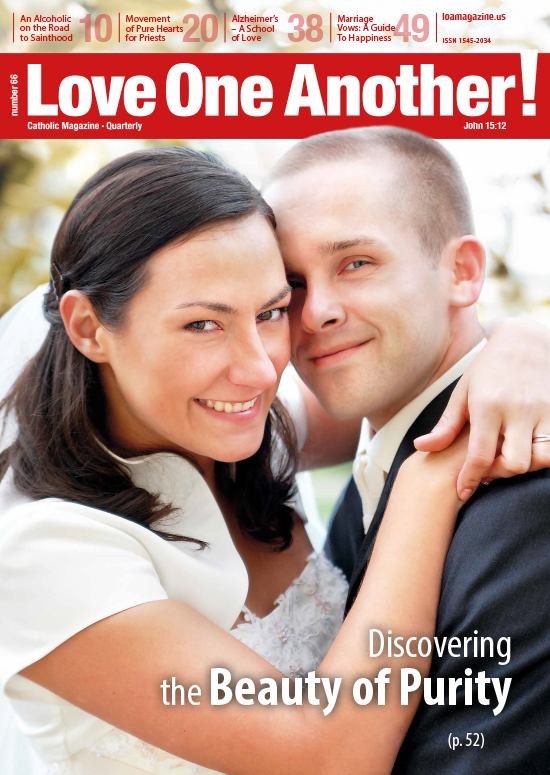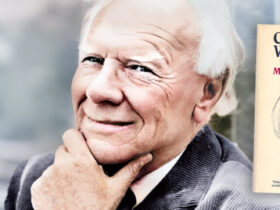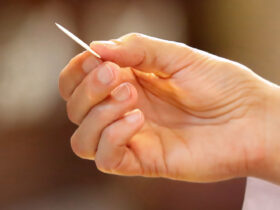How To Live in Freedom

A person must be sexually active, we here it said. You cannot expect a young man, for example, not to engage in it somehow. One way or another he will find a way. Self-abuse, they say, is a natural part of growing up and is even good for you. In time the habit will pass and be replaced by “normal sexual relations.”
The above ideology is a modern version of the so-called “glass of water” theory. If a person wants to drink, then he should satisfy the desire. It does not matter how he does this. He may use a glass. But a cup will do just as well, or he can drink straight out of the bottle. The important thing is to satisfy the desire. It was the Soviet communists in the 1920s who thought up and promulgated this theory with respect to sexual life. But they soon had to retract it when they saw its fatal consequences. Our contemporary liberals, often bearing academic titles and occupying important positions, are now promulgating the same thing. The media call them “modern and progressive.” Their precursors were praised for a time in the exactly the same way.
Addiction or freedom?
The Catechism of the Catholic Church states: “Chastity includes an apprenticeship in self-mastery, which is a training in human freedom. The alternative is clear: either man governs his passions and finds peace, or he lets himself be dominated by them and becomes unhappy” (CCC, 2339). Elsewhere it states: “Self-mastery is long and exacting work. One can never consider it acquired once and for all. It presupposes renewed effort at all stages of life. The effort required can be more intense in certain periods, such as when the personality is being formed during childhood and adolescence” (CCC, 2342). In other words, either a young person undertakes the long and demanding struggle for chastity, learns to govern his passions and finds peace, or else—as happens all too often—he gives up the struggle altogether in exchange for fleeting moments of pleasure, allows himself to become enslaved, and becomes unhappy.
In most cases, it is pornography that contributes to acts of masturbation. Contact with an erotic magazine or a pornographic film to a maturing boy’s mind is more or less like the shock to his body when the speeding car he is sitting in strikes a roadside tree. (Alas, too few adults (parents, teachers, and pastors) try to protect the young man from such a collision.) Once seen, the erotic images cannot be erased from the mind. They constantly reappear in the imagination, thus increasing the young man’s already heightened state of sexual tension. They become an obsession, which is all the harder to overcome since it is pleasurable. The boy’s thoughts, imagination, and feelings revolve increasingly around one thing. Everything else becomes less and less important. He loses his powers of concentration; finds it hard to study. He loses his ideals and interests. His emotional life begins to shrivel up, his spiritual life even more so. If a struggle with lust is not undertaken, the first sporadic “innocent” acts of self-abuse will soon lead to an addiction from which it is very hard to break free. Prolonged sexual addiction is as difficult to overcome as alcohol or drug addiction. It is then that we begin to talk rubbish like, “But a man has to be sexually active!” It is then that the condom seems to us like one of the greatest discoveries in the history of mankind. Our inner self-control is broken. The addict is no longer master of his body. He is now at the mercy—or rather in the power—of his addiction. Where will this new master lead him? How will the addiction develop? After all, free persons (i.e. those acting reasonably and responsibly) do not sexually abuse their own or other people’s children. They do not violate women, avail themselves of prostitutes, betray their wives, spread STPs, commit all kinds of perverse acts, etc. etc. Such are some of the bitter fruits of sexual addiction.
In the United States, according to Sex and Love Addicts Anonymous (SLAA), there are several millions of sex addicts requiring professional therapy. Eighty percent of them are men, since they form the vast majority of the clientele of the pornographic industry—the main cause of the problem. Relying on the AA (Alcoholics Anonymous) model, SLAA specializes in treating sexual addictions. (Similar therapeutic groups also exist in Poland.) The treatment involves total sexual abstinence for a period of three to five years. This clearly shows that a person does not have to be sexually active; indeed, such abstinence is even salutary. Thus in no way can sexual gratification be compared with slaking thirst or hunger. In the first instance we are dealing with a mere urge, while in the second we are talking of real bodily needs.
Clearly, not every young person who is habituated to self-abuse will fall into an extreme addiction. But in the present moral climate, created, it would seem, by sex addicts in influential positions, this margin will undoubtedly increase. But let us leave these extreme cases aside and focus on but one, most typical consequence of habitual masturbation.
Bitter fruits, good fruits
Why do so many girls come away from their premarital experience feeling exploited? Precisely because they agreed to have sex with a man who had not learned to control his passions. Only the external circumstances changed for him (it’s much nicer with a girl than on one’s own), but the mechanism of his sexual functioning remained the same. In this situation the girl is treated not as a person deserving of respect and love, but as an object to be used, a “tool” for indulging the habit of masturbation. The boy wanted to satisfy his habit, using her body for this purpose. The secular media call this “making love” and, interestingly enough, many believe in such a version of “love.” But an addicted person is by definition a selfish person. He dupes and uses others. He is blind to higher values such as respect for the other person. A man who has become addicted to self-abuse has been giving in to it for many years. He will not free himself from it the moment he gets married. The marriage vow frees no one from any acquired habits! This requires personal effort. Without it, the husband will continue to indulge his habit (just as in the above-mentioned instance of premarital sex)—no longer on his own, but with the body of his wife, the person who should dearest of all to him. These are not “normal sexual relations,” but a mere caricature of them.
The use of contraception in marriage is perhaps most frequently dictated by a lack of inner freedom. The husband is simply unable to abstain from sex during his wife’s fertile period. How else to explain plying her with harmful sterilizing chemical substances or using some absurd piece of latex in the married couple’s most intimate act? It is addiction that forces them to resort to such means. Can using one’s wife for indulging one’s habit give either spouse true happiness? Does this contribute to mutual love? Surely having a few moments of pleasure with someone and being happy with someone are two entirely different things?
Couples who have practiced the virtue of chastity before marriage experience the act quite differently. They have learned and are now able to control the demands of their sexual urges. They have acquired inner freedom. The conjugal act has the potential of uniting them in unique way. No other act has such power. It is important, then, to make use of this potential if the union of the spouses is to be deep and the marriage enduring. The marital act builds love and the union of the spouses only when it is the free gift of each of the spouses. “Free,” i.e. not forced by a physical urge, and “a gift,” i.e. a giving of one’s self. It is meant to be an act of mutual self-giving and acceptance, and thus of a profound union of lives through good times and bad. This is the normal experience of conjugal intimacy. It is one of the fruits of remaining chaste before marriage.
The habit of self-abuse (it really is a matter of abusing oneself), begun so “innocently” in our maturing years, has a great influence on the shape of the future marriage. Because of it, that vital part of the marital communion, which is the conjugal act, becomes catastrophically impaired, and loses its power to express and build marital love.
How to preserve one’s freedom?
Chastity is strictly a Christian virtue, which is not to say that all Christians achieve it, since not all are ready to undertake the long and exacting effort involved in attaining it. Chastity was known neither to the pagans in Jesus’ time, nor in the time of the USSR; nor is it known to today’s secular humanists. Writing to the converts from paganism in Ephesus, St. Paul observed: “So I declare and testify in the Lord that you must no longer live as the Gentiles do, in the futility of their minds; darkened in understanding, alienated from the life of God….They have become callous and have handed themselves over to licentiousness for the practice of every kind of impurity to excess” (Eph 4: 17-19). And again: “Immorality or any impurity (…) must not even be mentioned among you, as is fitting among holy ones, no obscenity or silly or suggestive talk, which is out of place” (Eph 5: 3-4). To live by this ideal we need help from above. We say the Jesus is our Savior—our one Savior. But what does this mean? It means that we need His help in order to struggle against temptations and to contend with our infirmity. Jesus saves us, i.e. He delivers us from our bondage to sin and Satan. He heals our wounds and gives us light that we may clearly see what is good and what is evil. St. Augustine wrote after his conversion: “I thought that when it came to self-restraint man could rely on his own powers….Fool! I did not know then that—as it is written—no one can practice self-restraint unless You enable him to do so. You would certainly have given me this grace if from the bottom of my heart I had called to You and if I had had sufficient faith to entrust my cares to You.” The example of St. Augustine, a great sinner and then a great saint, shows us not only how weak we are without the help of God’s grace, but also how radically we can change our lives with His grace. The important thing is to desire this change, and then to demand it of ourselves, while also seeking help from God—above all through prayer (by entrusting ourselves daily to Jesus by reciting the Prayer of Consecration of the Movement of Pure Hearts), confession, and the Eucharist—and through constant formation in the Movement of Pure Hearts, to which Jesus calls each and every one of us.






